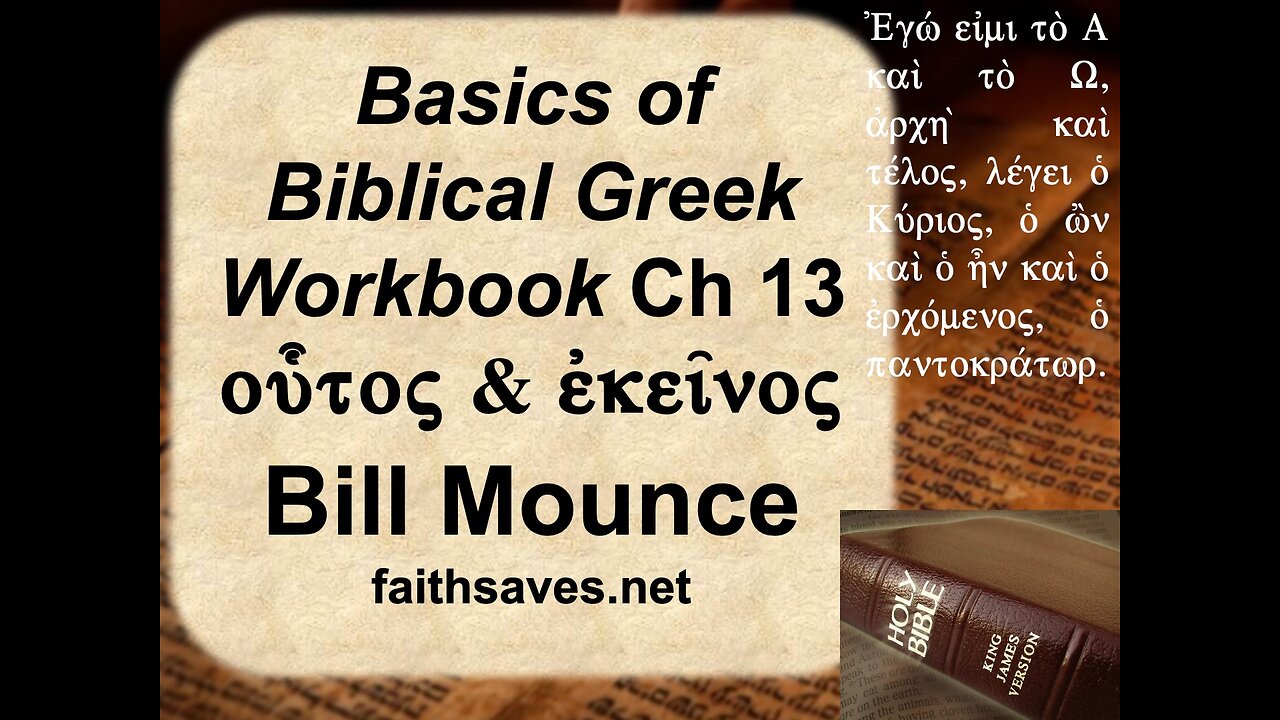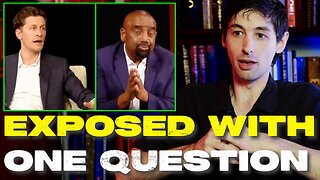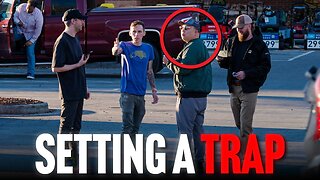Premium Only Content

New Testament / Koine Greek, 1st year, Lecture #13: BBG Workbook, Mounce, Chap 13-14 (start)
Lecture #13 in New Testament or Koine Greek, a first year Greek at a college or seminary level taught by independent Baptist professor Thomas Ross, covers chapter 13, "Demonstratives," and the first part of chapter 14, "Relative Pronouns," in Dr. Bill Mounce's Basics of Biblical Greek Workbook. All the parsing, warm up, translation, and additional exercises of chapter 13 are translated, covering parts of John 18:36; Matthew 3:1; Luke 1:34; Matthew 6:9; Matthew 20:4; Matthew 3:17; Matthew 10:23; John 10:18; Matthew 22:38; John 13:17; John 4:39; John 8:47; John 1:7-8; John 4:15; 1 John 3:3; Mark 11:28; John 12:27-28, 30; Genesis 2:23; Genesis 3:20; 1 Clement 55:3; Matthew 6:33; John 11:47; Matthew 10:2; John 14:20; Mark 13:32. The exercises of chapter 13 emphasis the uses of the Greek near demonstrative pronoun, houtos (οὗτος), and the far demonstrative pronoun, ekeinos (ἐκεῖνος).
The forms of houtos and ekeinos in the masculine, feminine, and neuter singular and plural are:
οὗτος αὕτη τοῦτο
τούτου ταύτης τούτου
τούτῳ ταύτῃ τούτῳ
τοῦτον ταύτην τοῦτο
οὗτοι αὗται ταῦτα
τούτων τούτων τούτων
τούτοις ταύταις τούτοις
τούτους ταύτας ταῦτα
ἐκεῖνος ἐκείνη ἐκεῖνο
ἐκείνου ἐκείνης ἐκείνου
ἐκείνῳ ἐκείνῃ ἐκείνῳ
ἐκεῖνον ἐκείνην ἐκεῖνο
ἐκεῖνοι ἐκεῖναι ἐκεῖνα
ἐκείνων ἐκείνων ἐκείνων
ἐκείνοις ἐκείναις ἐκείνοις
ἐκείνους ἐκείνας ἐκεῖνα
Furthermore, the parsing and warm-up sections of chapter 14 of William Mounce's Basics of Biblical Greek workbook are translated. Chapter 14 discusses the Greek relative pronoun. The forms of the relative pronoun are:
ὅς ἥ ὅ
οὗ ἧς οὗ
ᾧ ᾗ ᾧ
ὅν ἥν ὅ
οἵ αἵ ἅ
ὧν ὧν ὧν
οἷς αἷς οἷς
οὕς ἅς ἅ
Verses translated include John 2:23; 1 John 2:25; Mark 1:2; Luke 5:3; Mark 9:40; Revelation 1:4; Philippians 4:9.
In addition, in conjunction with the discussion of Mark 13:32, the glorious ignorance of the Son's knowledge of the day and hour of the second coming is discussed. The Lord Jesus Christ's limitation in knowledge is an essential aspect of His true humanity and His condescension and by no means undermines His true Deity. The verse reads:
But of that day and that hour knoweth no man, no, not the angels which are in heaven, neither the Son, but the Father.
περὶ δὲ τῆς ἡμέρας ἐκείνης καὶ τῆς ὥρας οὐδεὶς οἶδεν, οὐδὲ οἱ ἄγγελοι οἱ ἐν οὐρανῷ, οὐδὲ ὁ υἱός, εἰ μὴ ὁ πατήρ.
Professor Ross quotes as follows from Thomas F. Torrance's book The Trinitarian Faith:
It is basically the same argument that is to be applied to the atoning exchange between ignorance and wisdom in Christ—a problem that was much discussed in the fourth century, for the Arians had appealed to passages in the Gospels such as those in which it was said of Jesus that he increased in wisdom and even was lacking in knowledge [Luke 2:52; Mark 13:32]. Athanasius handled this question in entire consistency with his arguments about what the Son of God had done in making himself one of us and one with us in what we actually are in order to save us. That is to say, while the Son or Word of God who is one and the same being as the Father enjoys a relation of mutual knowing between himself and the Father, nevertheless in his self-abasement in the form of a servant he had condescended, for our sakes, really to make our ignorance along with other human limitations his own, precisely in order to save us from them. "He incorporated the ignorance of men in himself, that he might redeem their humanity from all its imperfections and cleanse and offer it perfect and holy to the Father." ... [The] reality of our Lord’s ignorance [is] essential to his humanity ... the ignorance of Christ was just as essential to his amazing self-abasement or kenosis as his physical imperfections and limitations ... It was an economic and vicarious ignorance on our Lord’s part by way of a deliberate restraint on his divine knowledge throughout a life of continuous kenosis in which he refused to transgress the limits of the creaturely and earthly conditions of human nature.
As the Word or Mind of God become flesh Jesus Christ was the incarnate wisdom of God, but incarnate in such a way as really to share with us our human ignorance, so that we might share in his divine wisdom. This was not just an appearance of ignorance on his part, any more than his incarnating of the Word or Mind of God was only in appearance. Had either been in appearance only, it would have emptied the economic condescension of the Son to save and redeem of any reality. Unless the Son of God had assumed the whole nature of man, including his ignorance, man could not have been saved. ... [T]he human mind is an absolutely essential element in creaturely being. Hence God in Christ Jesus took it up into himself along with the whole man ... Jesus Christ came among us sharing to the full the poverty of our ignorance, without ceasing to embody in himself all the riches of the wisdom of God, in order that we might be redeemed from our ignorance through sharing in his wisdom.
-
 LIVE
LIVE
StoneMountain64
3 hours ago#1 Battlefield Mastery Session with the BOYS
197 watching -
 1:23:45
1:23:45
Roseanne Barr
4 hours agoDeclassifying Presidential Sex Slavery W/ Cathy O’Brien | The Roseanne Barr Podcast #113
93.5K32 -
 LIVE
LIVE
FusedAegisTV
18 hours agoHollow Knight Silksong Waiting Room ~~ pt. I
77 watching -
 8:37
8:37
Warren Smith - Secret Scholar Society
7 hours agoJesse Lee Peterson EXPOSES How Stupid David Pakman Really Is
19.3K11 -
 44:44
44:44
Scammer Payback
9 hours agoCrazy Confrontation with Hacked Scammer Group
14.5K2 -
 1:09:00
1:09:00
vivafrei
4 hours agoKamala Harris Security Being "Pulled"? Kilmar Wants Trump Admin GAGGED! Fake News GALORE & MORE!
70.5K35 -
 1:33:32
1:33:32
The Quartering
6 hours agoContest Winners Picked, More Trans Attacks, SNL Collapsing, Raja Jackson STILL Not Arrested!
207K171 -
 1:19:44
1:19:44
Mark Kaye
6 hours ago🔴 Kamala FURIOUS Over Trump's Latest Move!
33.7K14 -
 2:52:14
2:52:14
LumpyPotatoX2
3 hours agoSkate: Early Access - #RumbleGaming
16.3K -
 21:14
21:14
Jasmin Laine
4 hours ago“Absolute Nonsense Policy”—CBC Guest DROPS Savage TRUTH! Poilievre LEAVES Reporters SPEECHLESS
22K15